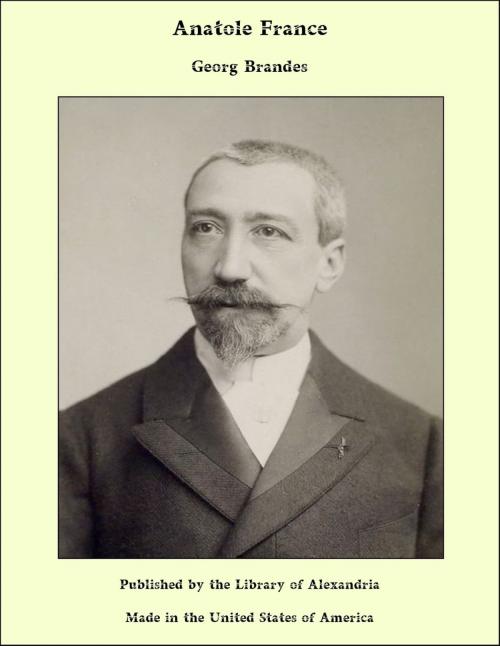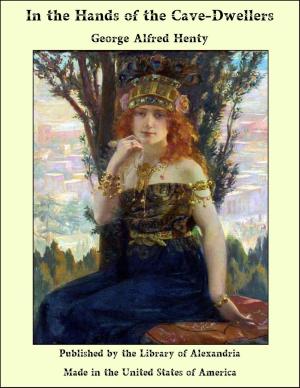| Author: | Georg Brandes | ISBN: | 9781465604972 |
| Publisher: | Library of Alexandria | Publication: | March 8, 2015 |
| Imprint: | Language: | English |
| Author: | Georg Brandes |
| ISBN: | 9781465604972 |
| Publisher: | Library of Alexandria |
| Publication: | March 8, 2015 |
| Imprint: | |
| Language: | English |
The true author is recognisable by the existence on every page of his works of at least one sentence or one phrase which none but he could have written. Take the following sentence: "If we may believe this amiable shepherd of souls, it is impossible for us to elude divine mercy, and we shall all enter Paradise—unless, indeed, there be no Paradise, which is exceedingly probable." It treats of Renan. It must be written by a disciple of Renan's, whose humour perhaps allows itself a little more licence than the master's. More we cannot say. But take this: "She was the widow of four husbands, a dreadful woman, suspected of everything except of having loved—consequently honoured and respected." There is only one man who can have written this. It jestingly indicates the fact that society forgives woman everything except a passion, and communicates this observation to the reader, as it were with a gentle nudge. Or take the following: "We should not love nature, for she is not lovable; but neither should we hate her, for she is not deserving of hatred. She is everything. It is very difficult to be everything. It results in terrible heavy-handedness and awkwardness." There is only one man who would excuse Nature for her indifference to us human beings in these words: "It is very difficult to be everything." Read this passage: "It is a great infirmity to think. God preserve you from it, my son, as He has preserved His greatest saints and the souls whom He loves with especial tenderness and destines to eternal felicity." It is an Abbé who speaks thus, and who speaks without a trace of irony. One is conscious of the author's smile behind the Abbe's seriousness. Few are so pithy in their irony as France. He says: "Cicero was in politics a Moderate of the most violent description." Few are so picturesque in their satire as he. Others have used the phrase: Equality before the law—that means equality before the laws which the well-to-do have made for the poor, and men for women. Others have maintained that the ideal of justice would be an inequality before the law adjusted to the differences between individuals. Others have said: If there is inequality in law itself, where is equality to be found? But there is only one man who can have written: "The law, in its majestic equality, forbids the rich as well as the poor to sleep under bridges, to beg in the streets, and to steal bread." This one man is Anatole France. Most noticeable in this style is its irony; it stamps him as a spiritual descendant of Renan. But in spite of the relationship, France's irony is of a very different description from Renan's. Renan, as historian or critic, always speaks in his own name, and we are directly conscious of himself in the fictitious personages of his philosophic dramas, and even more so in those of his philosophic dialogues. France's irony conceals itself beneath naïveté. Renan disguises himself, France transforms himself. He writes from standpoints which are directly the opposite of his own—primitive Christian, or mediæval Catholic—and through what is said we apprehend what he means. Other writers may be as witty, may be or appear as delicately ironical—they still do not resemble him. If we enter the dépôt of some famous china manufactory with a piece of china from some other factory, as faultless and as beautiful in colour as those by which we are surrounded, the saleswoman takes it into her hand, looks at it, and says: "The paste is different."
The true author is recognisable by the existence on every page of his works of at least one sentence or one phrase which none but he could have written. Take the following sentence: "If we may believe this amiable shepherd of souls, it is impossible for us to elude divine mercy, and we shall all enter Paradise—unless, indeed, there be no Paradise, which is exceedingly probable." It treats of Renan. It must be written by a disciple of Renan's, whose humour perhaps allows itself a little more licence than the master's. More we cannot say. But take this: "She was the widow of four husbands, a dreadful woman, suspected of everything except of having loved—consequently honoured and respected." There is only one man who can have written this. It jestingly indicates the fact that society forgives woman everything except a passion, and communicates this observation to the reader, as it were with a gentle nudge. Or take the following: "We should not love nature, for she is not lovable; but neither should we hate her, for she is not deserving of hatred. She is everything. It is very difficult to be everything. It results in terrible heavy-handedness and awkwardness." There is only one man who would excuse Nature for her indifference to us human beings in these words: "It is very difficult to be everything." Read this passage: "It is a great infirmity to think. God preserve you from it, my son, as He has preserved His greatest saints and the souls whom He loves with especial tenderness and destines to eternal felicity." It is an Abbé who speaks thus, and who speaks without a trace of irony. One is conscious of the author's smile behind the Abbe's seriousness. Few are so pithy in their irony as France. He says: "Cicero was in politics a Moderate of the most violent description." Few are so picturesque in their satire as he. Others have used the phrase: Equality before the law—that means equality before the laws which the well-to-do have made for the poor, and men for women. Others have maintained that the ideal of justice would be an inequality before the law adjusted to the differences between individuals. Others have said: If there is inequality in law itself, where is equality to be found? But there is only one man who can have written: "The law, in its majestic equality, forbids the rich as well as the poor to sleep under bridges, to beg in the streets, and to steal bread." This one man is Anatole France. Most noticeable in this style is its irony; it stamps him as a spiritual descendant of Renan. But in spite of the relationship, France's irony is of a very different description from Renan's. Renan, as historian or critic, always speaks in his own name, and we are directly conscious of himself in the fictitious personages of his philosophic dramas, and even more so in those of his philosophic dialogues. France's irony conceals itself beneath naïveté. Renan disguises himself, France transforms himself. He writes from standpoints which are directly the opposite of his own—primitive Christian, or mediæval Catholic—and through what is said we apprehend what he means. Other writers may be as witty, may be or appear as delicately ironical—they still do not resemble him. If we enter the dépôt of some famous china manufactory with a piece of china from some other factory, as faultless and as beautiful in colour as those by which we are surrounded, the saleswoman takes it into her hand, looks at it, and says: "The paste is different."















